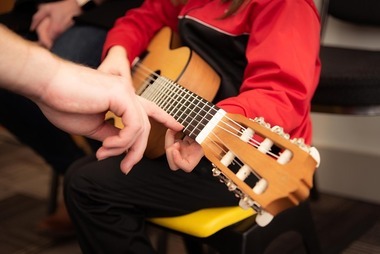Guitar improvisation is the art of creating music spontaneously, often in the context of a solo or jam session. It’s a skill that allows guitarists to express themselves creatively and interact with other musicians in real-time. In this article, we’ll explore some techniques and approaches to help you master the art of guitar improvisation.

1. Learn Basic Music Theory
While improvisation is often associated with spontaneity and creativity, having a solid understanding of music theory can provide a framework for your improvisations. Learn about scales, chords, and chord progressions, as well as concepts like melody, harmony, and rhythm. Understanding these fundamentals will give you a foundation to build upon when improvising.
2. Know Your Scales
Scales are the building blocks of improvisation, so it’s essential to know them inside and out. Start by learning the major and minor scales, as well as the pentatonic and blues scales, which are commonly used in improvisation. Practice playing these scales up and down the fretboard in different positions and keys.
3. Experiment With Phrasing
Phrasing refers to the way you structure and articulate musical ideas in your improvisations. Experiment with different rhythms, articulations, and dynamics to create interesting and expressive phrases. Pay attention to the way you start and end phrases, as well as the space between them. Try to develop your own unique voice and style as a guitarist.
4. Use Call-And-Response
Call-and-response is a common improvisational technique where one musician plays a phrase, and another responds with a complementary phrase. Practice this technique with backing tracks, jam sessions, or other musicians. Listen to what others are playing and respond accordingly, creating a musical dialogue in real-time.
5. Embrace Mistakes
Improvisation is all about taking risks and exploring new musical ideas, so don’t be afraid to make mistakes. Embrace imperfection and use it as an opportunity to learn and grow as a musician. Remember that some of the most memorable musical moments come from spontaneity and experimentation.
6. Develop Your Ear
A strong ear is essential for improvisation, as it allows you to listen and respond to the music in real-time. Practice ear training exercises like transcribing solos, identifying intervals, and playing melodies by ear. The better your ear becomes, the more confident and expressive you’ll be as an improviser.
7. Play With Feeling
Ultimately, improvisation is about expressing yourself and connecting with your audience on an emotional level. Focus on playing with feeling and conveying emotion through your music. Don’t get too caught up in technicalities or trying to impress others—instead, let your passion and creativity shine through in your playing.
8. Practice, Practice, Practice
Like any skill, improvisation takes time and practice to master. Set aside regular practice time to work on your improvisational skills, whether it’s jamming with friends, playing along with backing tracks, or simply noodling around on your own. The more you practice, the more confident and fluent you’ll become as an improviser.
Improvisation is a lifelong journey, and there’s always room for growth and exploration. Keep an open mind, stay curious, and most importantly, have fun with it!



